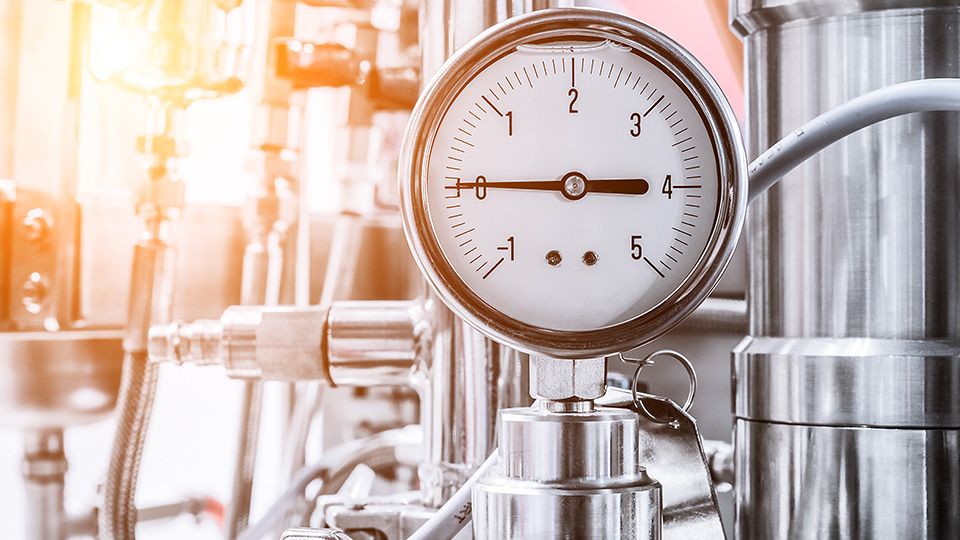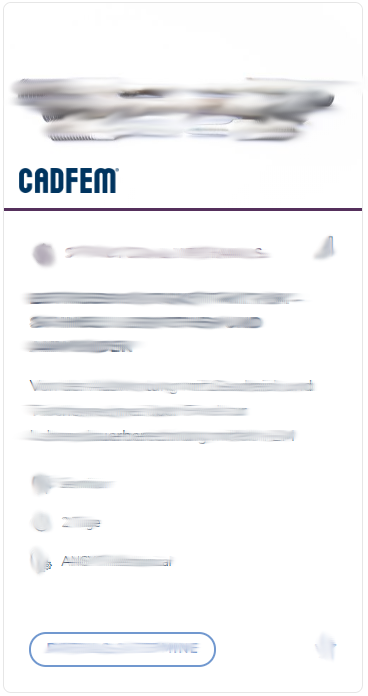
Numerical Analysis of Pressurized Equipment

Analytical eligibility and fatigue verification. Standardized implementation using FEM for the design of pressurized containers. This training is offered as a 3-day course.
Duration
3 days
Prerequisites
Basic knowledge of Ansys Mechanical
Software used
Ansys Mechanical
- Understanding EN13445, AD2000, and ASME BPVC Section VIII Division 2
- Understanding methods for analytical eligibility/fatigue verification
- Mastering standardized implementation with the aid of FEM
- Understanding the specifics of model building/assessment of results
Description
Pressure equipment refers to containers (unfired pressure vessels), boilers, pipelines, pressure-retaining equipment and equipment with an internal pressure of over 0.5 bar. There are several guidelines for the design of such vessels, but which guidelines must be considered in the design? How can simulation aid in the design of pressure vessels? These and many other questions will be answered in this seminar.
You will become familiar with the directives and guidelines that apply to the design of pressure equipment, including EN13445, AD2000, and ASME BPVC Section VIII Division 2. You will understand the different methods of eligibility and fatigue verification and be able to distinguish the areas of application. You will become confident with standardized implementation with the aid of FEM. You will understand the specifics associated with model building and the assessment of analysis results, and will l know how to apply the suggested procedures in practice.
This training course on expert level is aimed at design, calculation, and test engineers who deal with the design and safety verification of pressurized containers. Basic knowledge of Ansys Mechanical is required.
Detailed agenda for this 3-day training
Day 1
01 Methods of Stress Categorization (according to AD2000) - I
- Difference between stress categories
- Theoretical principles
- Stress evaluation
- Example: Dished boiler end
02 Methods of Stress Categorization (according to AD2000) - II
- Elasticity limit, load capacity limit
- Linearization of stress components
- Example: Bottom plate with relief groove
03 Analytical Admissibility Verification as per EN 13445-3, Annex B
- Failure types and verification of time-independent stress values
- Failure types and verification of time-dependent strength values:
- Loads and their design values:
- Partial safety factors
- Example: Determination of partial safety factors
04 Load Bearing Capacity Verification as per EN 13445-3, Annex B
- Binding rules and corresponding application rules
- Materials laws for load bearing capacity verification
- Use of the yield condition in accordance with von Mises
- Structural stress and structural strain
- Assessment of plastic strain
- Example: Bottom plate with relief groove
Day 2
05 Verification with FEM in pressure vessel construction
- Responding to linear-elastic behavior
- Evaluating component behavior based on plastic strain
- Response verification – binding rule
- Design values of yield limits
- Responding to elastic behavior
- Example: Dished boiler end
06 Summary of the Admissibility Verification
- Stress categorization
- Analytical admissibility verification
- Information for the report
- Example: Comparison of computation methods
07 Stability Proof according to EN 13445-3
- Binding rule
- Procedure
- Partial safety factors: Actions, material
- Bifurcation buckling forms
- Example: dished boiler end with overpressure on the convex side
08 Creep Verifications as per EN 13445-3
- Creep strength variables
- Welded connections
- Verification in the creep range
- Creep strength verification KFN
- Creep strain verification KDN
- Creep fatigue verification KEN
- Example: Level floor with relief groove
Day 3
09 Fatigue Verification as per AD2000 and EN 13455 - Basics
- Damage mechanism
- Linear damage accumulation
- Load cycle counting procedure
- Simplified verification
- Reference stress range and reference average stress
- Example: Cylinder under vacuum and internal pressure, determination of equivalent stress range
10 Fatigue Check According to AD2000 and EN 13455 - Detailed Check
- Effective voltage swing
- Influencing factors
- Medium stress and overelastic load cycles
- Proof of weld seams
11 Example Fatigue Check
- Ball resonator under variable internal pressure load
- Detection of unwelded areas
- Proof of welded areas
12 Outlook on Further Topics
- Automation options (ACT, APDL)
- Modelling aspects
- ASME Overview
Your Trainers

Dr.-Ing. Sebastian Schindler
Placement in the CADFEM Learning Pathway
Participant data
Additional information
Commentary
Whether eLearning, classroom courses, live online training or customized workshops - together we identify the best option for you.
What CADFEM customers are saying
Do you have questions on the training?
If you book through your university, you will receive a 50% discount on the stated fee on training courses and eLearning courses.
For more information on the validity and how booking with the code ACADEMIC50 works, please visit our page on training for academic users.
Straight after you sign up, an automatic confirmation of receipt will be sent to the email addresses you provided. Once you have successfully verified the data you provided, you will receive your personalized sign-up confirmation, containing further information on course fees, the billing address, etc., by email within two to three working days.
As soon as the minimum number of attendees has been reached, you will receive a final training confirmation containing further information. If you have booked an on-site training, we recommend that you wait until you have received this final confirmation before booking your travel and accommodation.
If the minimum number of attendees is not reached, we reserve the right to cancel the training seven days before it is due to start at the latest. We are happy to inform you on changing your booking to an alternative date. Please note that we accept no liability for hotel or travel bookings that attendees have already made.
Usually the training courses start at 9:00 am and end at 5:00 pm of the respective local time. The actual course times will be stated in the booking confirmation. Please note that, depending on the training host, there may be a possible time shift between your and the provider's local time. Therefore all local times are provided with the valid time shift to Greenwich Mean Time (GMT).





